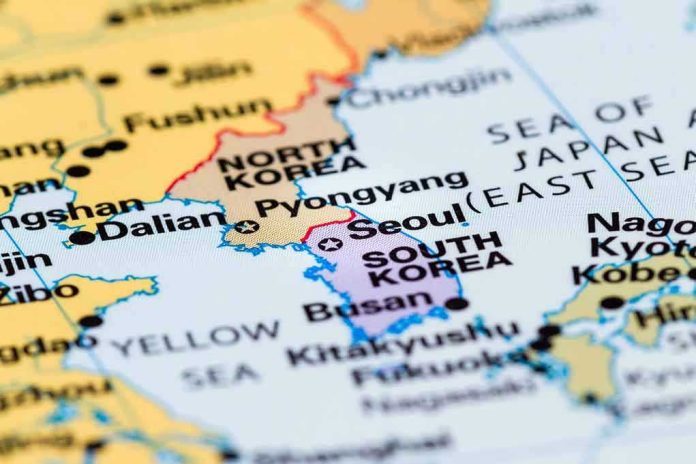
North Korea’s icy rebuke of South Korea’s new president’s peace overtures has slammed the door on any hope of reconciliation, leaving the Korean Peninsula locked in a standoff that shows no signs of thawing—despite desperate attempts at appeasement from Seoul.
At a Glance
- Kim Yo Jong, sister of Kim Jong Un, declared there is “nothing to discuss” with South Korea’s new administration.
- President Lee Jae Myung’s efforts to halt border provocations and call for dialogue have been flatly rejected by Pyongyang.
- North Korea’s first official response to Lee’s presidency signals a hardening “two hostile states” policy.
- Repeated conciliatory gestures from Seoul have failed, leaving border tensions and humanitarian hopes in limbo.
North Korea Slams the Door on Dialogue
North Korea has wasted no time making its disdain for South Korea’s new president abundantly clear. On July 28, Kim Yo Jong, the powerful sister of Kim Jong Un, issued a statement through the Korean Central News Agency, declaring that there is “nothing to discuss” with President Lee Jae Myung or his administration. This is not just a diplomatic cold shoulder; it’s a brick wall, thrown up in the face of every effort Lee has made to thaw relations. Pyongyang’s response wasn’t ambiguous or couched in the usual diplomatic double-speak. It was a full-throated rejection, dismissing Lee’s gestures as both futile and naïve.
President Lee’s early actions—halting propaganda broadcasts at the border, repatriating North Korean fishermen, and urging activists to stop sending anti-Pyongyang leaflets—were supposed to signal goodwill. Instead, they have been met with open contempt. Kim Yo Jong went so far as to accuse Lee of “blind trust” in the United States and dismissed the suspension of border broadcasts as a minor, reversible act that never should have happened in the first place. For anyone still holding out hope of a new era on the peninsula, every line of Kim’s statement has made it clear: North Korea isn’t interested, not now, and not anytime soon.
Seoul’s Conciliatory Gamble Falls Flat
President Lee Jae Myung, who took office in June 2025, had staked his reputation on a gamble—one that, frankly, now looks more like a political miscalculation. After years of hardline policy under his predecessor, Lee rolled out the red carpet for dialogue, even at the risk of alienating security hawks at home. He stopped the loudspeakers blaring propaganda into the North, repatriated North Korean fishermen, and called for “dialogue without preconditions.” But instead of reciprocation, he got a door slammed in his face by Kim Yo Jong herself. North Korea’s message: appeasement buys you nothing but scorn. It is a lesson South Korea’s left-leaning leaders never seem to learn, no matter how many times they get burned.
Lee’s approach also included urging South Korean activists to stop sending anti-North leaflets, a move meant to de-escalate tensions but criticized at home for caving to Pyongyang’s demands. None of these gestures moved the needle. North Korea, now firmly entrenched in a policy of treating the South as a hostile, separate state, has simply pocketed the concessions and walked away. The message could not be clearer: there is no appetite in Pyongyang for even the most basic forms of engagement, let alone reconciliation.
Hardline Policies and a Frozen Frontier
Kim Jong Un’s regime has spent the last two years doubling down on its hardline posture. In late 2023, Kim declared that North and South Korea were “two states hostile to each other,” marking a formal end to even the pretense of eventual unification. Since then, the North has matched every southern overture with new provocations—balloons filled with garbage, retaliatory broadcasts, and saber-rattling at the border. The Lee administration’s attempts at engagement have been met not with dialogue, but with derision and more psychological warfare.
The consequences are real, not just for diplomats and politicians, but for ordinary Koreans on both sides of the border. Families divided by the 38th parallel have watched, again, as hopes for reunions and humanitarian exchanges vanish. Economic cooperation projects remain frozen solid. The only thing moving at the border is the steady escalation of tension, with both militaries on constant alert and no relief in sight.
Expert Consensus: No Thaw on the Horizon
Analysts agree: North Korea’s rejection is not a negotiating ploy—it’s a reaffirmation of a hardened policy. Experts point to Kim Yo Jong’s central role as a sign that this is policy straight from the top, not a negotiating tactic or a temporary setback. Academic observers say that Pyongyang’s distrust of Seoul’s U.S. alliance, as well as continued joint military drills, make any real progress impossible for the foreseeable future. The border remains a flashpoint, not a bridge.
For those who still believe in appeasement, the events of July 28 should be a wake-up call. North Korea is not looking for peace talks. It is not looking for compromise. It is looking to cement its status as a hostile, nuclear-armed regime, and it is more than willing to let the South twist in the wind. Any illusions otherwise have now been thoroughly dispelled.
Sources:
DW: North Korea Kim Jong Un’s sister rejects South’s overtures
Korea Herald: Kim Yo-jong rejects Lee’s peace overtures
NK News: North Korea says Lee’s overtures futile
Bloomberg: North Korea rebuffs new South leader’s attempt to ease tensions
France24: North Korea rejects South Korea talks







